3 Major Lessons Hollywood Should Take Away From The Success Of 'Logan' And 'Wonder Woman'
We have three studios competing to launch their superhero blockbusters — Fox, Marvel Studios and Warner Bros. — and so far this year, all three are knocking it out of the park.
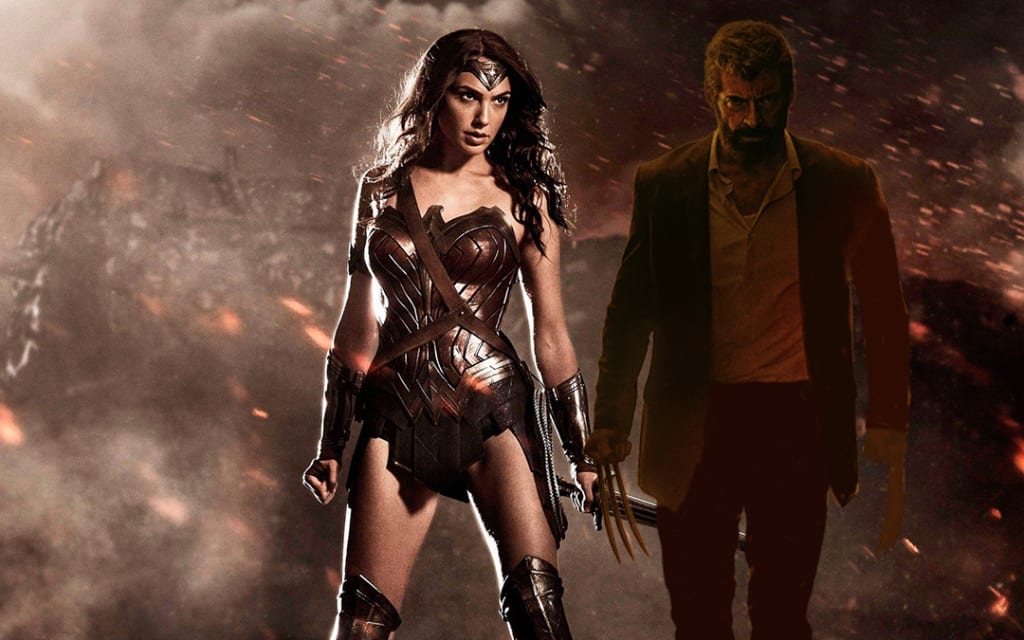
It's a good time to be a superhero fan. We have three studios competing to launch their superhero blockbusters — Fox, Marvel Studios and Warner Bros. — and so far this year, all three are knocking it out of the park. Logan was an absolute triumph for director James Mangold, wowing fans with its heartfelt narrative. Guardians of the Galaxy Vol. 2 was a jubilant celebration of the cosmic side of the #MCU, with surprisingly dark themes. And now Wonder Woman has proved to be a tremendous hit!
As different as these three superhero movies may be, they teach similar lessons for Hollywood. Here's what studios need to learn from their own successes:
1. Trust Your Directors
Throughout the whole marketing campaign for Wonder Woman, Warner Bros. has continually stressed that the finished film is Patty Jenkins's vision. We recently learned the extent to which that's the case; that famous, beloved No-Man's-Land scene? Studio executives didn't think it made any sense. As Jenkins explained:
"It's my favorite scene in the movie and it's the most important scene [...] It's also the scene that made the least sense to other people going in, which is why it's a wonderful victory for me."
Time and again, Jenkins had to explain that this was no mere action scene — it was a character's defining moment. She was so passionate about the scene that she even storyboarded it on her own! In the end, not only did Patty Jenkins triumph with this part of the film, she's revealed that literally no scenes were cut from the final theatrical release.
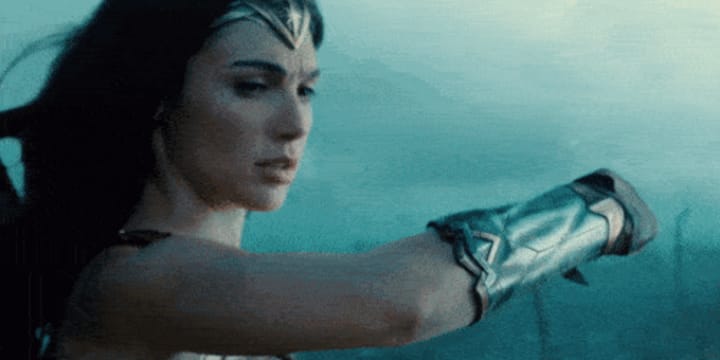
A triumph! 'Wonder Woman' [Credit: Warner Bros.]
Or take #Logan. A brutal, bloody Western, the film is very much James Mangold's vision. It strays from the norms of the superhero genre (in fact, Mangold doesn't even seem to be convinced that there's such a thing as the superhero genre). And it does so successfully, telling a character-rich tale in a style that no superhero film has ever tried before. Like Warner Bros., Fox trusted its director — and the result was a hit.
The same is true of #GuardiansOfTheGalaxyVol2. Whereas previous Marvel directors have struggled to tie their films into the overarching narrative of the MCU, James Gunn was given a remarkable amount of freedom. As he explained last September, "The film, story and character arcs are all mine."
You can see the pattern here. In all three cases, the studios stepped back and allowed their directors to do their own thing. Contrast this with two of last year's more controversial offerings: Batman v Superman and Suicide Squad. In both cases, the studio intervened, and the directors' visions were damaged. There's a reason why the Ultimate Edition of Batman v. Superman is so much better than the theatrical cut.
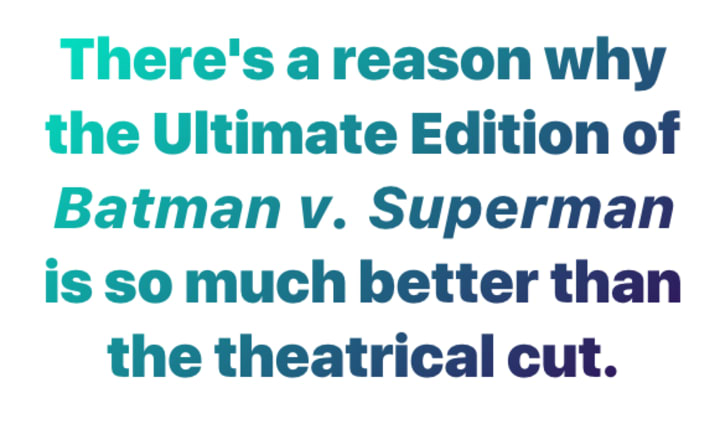
For Warner Bros., the success of Wonder Woman is an important lesson. The studio execs tampered so much with Suicide Squad and Batman v Superman that they sabotaged their own films. In contrast, with Wonder Woman they took a step back. Sure, they challenged Patty Jenkins, but when the director refused to cut that No-Man's Land scene? She won. That, in itself, suggests that the studio is beginning to learn that decision-makers need to trust their directors.
2. The New Formula Is No Formula
For a time, it felt as if superhero movies were becoming cookie-cutter tentpoles — big-bucks affairs that played it safe to make a fortune from tie-in merchandise. Cast your eyes to the market leader in the superhero genre, Marvel, and you see a studio that started out taking chances, but has become more conservative as it goes on to maintain its brand.
However, Deadpool was decidedly experimental. So much so that it's a film Marvel Studios would never have made. The film's success taught Fox that it was okay to take chances with superhero movies, to make movies that embrace a far greater range in terms of style and tone. It gave Fox a new confidence — and Logan was the result.
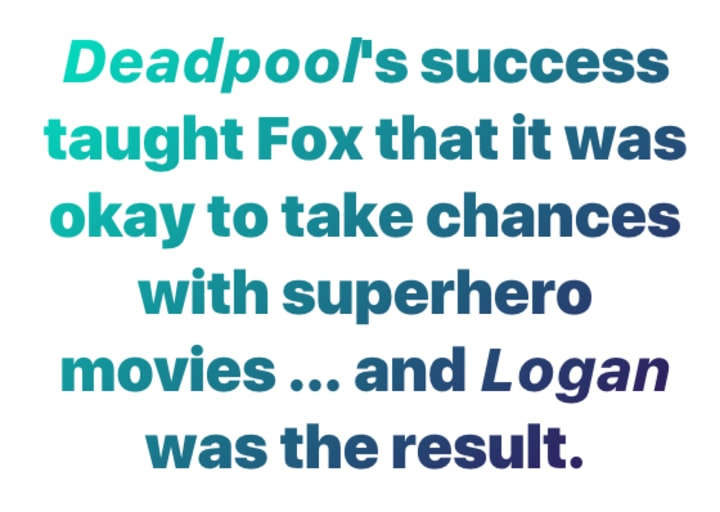
Wonder Woman, meanwhile, may be a traditional superhero story in tone and style, but it's also a celebration of diversity. After all, it completely explodes the myth that female-led superhero films don't work! It's also breaking every record for box office performance from a female director.
The common thread here is diversity. Deadpool and Logan teach us that we can broaden the range of superhero films; Wonder Woman definitively proves that you can have a broader range of stars as well.
Over the last two years we've actually seen Fox take the lead in terms of creativity — they broke the mold with Deadpool and Logan. Marvel, in contrast, is a little "locked in" by its own successful brand — and, as a result, the studio remains reactive. Fortunately, visionary studio chief #KevinFeige is openly toying with the idea of abandoning the MCU's traditional phases, where every film is part of the journey to a massive tentpole movie like next year's Avengers: Infinity War. All too often, this overarching narrative meant writers and directors were forced to distort their scripts in order to seed the next event.
Ditching the phased approach would give directors room to breathe, and would allow them to focus on simply making the best film they can — rather than distracting them with setup for the next movie.
3. It's Time For Superheroes To Explore Beyond The Superhero Genre
As mentioned before, Logan was a superhero Western. Deadpool was a superhero comedy. Wonder Woman was a superhero mythological war movie. Studios are beginning to realize that these characters work best in new and unexpected contexts.
For the next tentpole X-Men film, X-Men: Dark Phoenix, we've been getting tantalizing hints that the film will embrace the science-fiction side of the X-Men universe. And Josh Boone's #NewMutants seems set to be an outright horror film, with Boone revealing:
"We are making a full-fledged horror movie set within the X-Men universe. There are no costumes. There are no supervillains. We’re trying to do something very, very different."
If you cast your eyes over to Marvel, it's no coincidence that they're giving James Gunn ever more leeway. Meanwhile, the first trailer for Thor: Ragnarok suggests that Taika Waititi is redefining that franchise to suit his own vision and style.
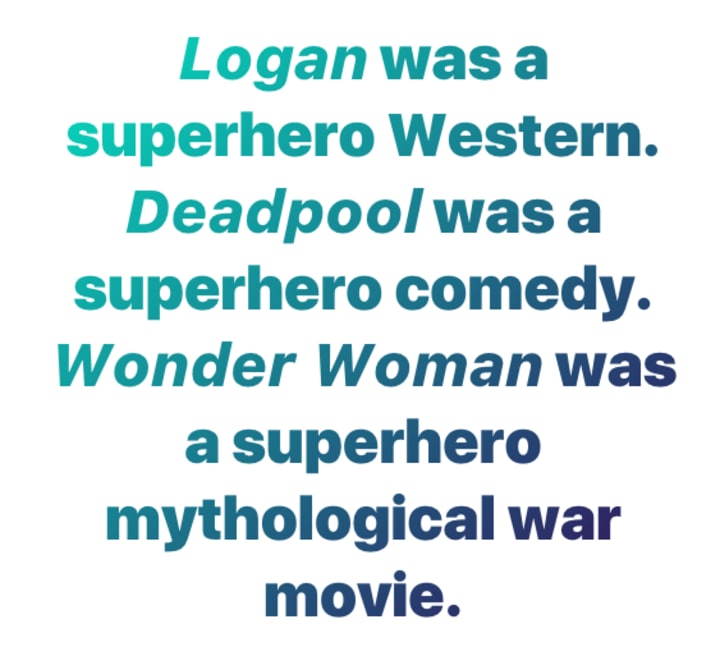
2017 has been a groundbreaking year for superhero films so far, and we're only halfway through. The rest of the year will see Tom Holland launch into his first solo Spider-Man movie, Thor take on the Hulk and battle to save Asgard, and the Justice League gather together for the first time in cinematic history. But as we look ahead, it pays to recognize the important lessons we've learned so far.
About the Creator
Tom Bacon
A prolific writer and film fan, Tom has a deep love of the superhero genre.






Comments
There are no comments for this story
Be the first to respond and start the conversation.